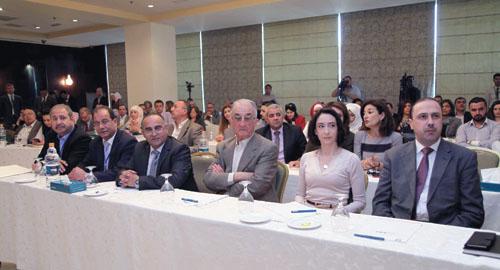You are here
‘In Arab satellite mediascape, quantity reigns over quality’
By Laila Azzeh - May 05,2015 - Last updated at May 05,2015

AMMAN — The quantitative media “inundation” has reached an “unprecedented” level in the Arab world, home to more than 1,400 satellite channels, most of which provide “minimal” substance, according to a media expert.
Furthermore, and due to the rise of terrorism and violence in the region since 2011, more than 20 per cent of Arab satellite broadcasting is made up of religion proselytising channels, said Basim Tweissi, dean of the Jordan Media Institute (JMI).
Speaking at the “Radio and Television Broadcasting: Policies, Transformations and Challenges” conference on Tuesday, Tweissi highlighted that there are “fierce” clashes to control Arab TVs in order to promote certain political, social and cultural concepts.
“Over the past years, the media industry has invested in the disputes witnessed in the region in a way that made some [outlets] record the worst moral deviations in decades,” he said.
The JMI dean noted that although Jordan is the second Arab country to liberate the TV and radio broadcasting sector, roadblocks still exist in the way of building a prosperous national industry in this regard.
During the first day of the conference, attended by HRH Princess Rym, participants debated hot-button issues related to the reality of broadcast in the region with remorse and blame dominating the sessions.
“We have over 120,000 Arabic expressions and only about 500 are being used by TV channels… this results in a peripheral understanding of the reality, especially sensitive issues, such as the Arab-Israeli conflict,” said Slimane Zeghidour, chief editor of TV5 Monde.
He noted that the competition among Arab countries when it comes to introducing new expressions is preventing the initiation of an Arab glossary that includes new political, economic and social expressions.
On the other hand, Zeghidour noted that unifying the expressions used in different media outlets is almost impossible with the “jealousy” Arab language academies feel towards each other.
Opposing his sentiments, Hosam Sokkari, media consultant and former head of BBC Arabic, said “our problem lies in the need to have a reference instead of innovating and coming up with new expressions that reflect the reality,” citing the first time he translated the word “netters” into Arabic and the criticism he received.
“Do we have an Arab glossary that is equivalent to the Oxford dictionary?”
MP Rula Hroub spoke about legislation governing media in Jordan and the loopholes that should be addressed.
“The media industry in Arab countries and the whole world is generating millions of millions, but is suffering a severe drought in Jordan because no law has managed to contain this huge body,” she said.
In Jordan, there are 44 satellite channels and 36 radio stations, as well as 28 Arab channels broadcasting from Amman, in addition to 440 accredited journalists working in the field, according to Amjad Qadi, director general of the Jordan Media Commission.
Media practitioners, experts and academics from several countries are taking part in the JMI’s two-day conference, held in cooperation with the Norwegian Institute of Journalism.
Discussions also cover the latest social media trends, difficulties facing women journalists and the ethics of television broadcasting.
Related Articles
A conference titled “Radio and Television Broadcasting: Policies, Transformations, Challenges” opens in Amman on Tuesday.
AMMAN — The number of satellite television channels broadcasting from Jordan reached 45 at the end of 2015, according to Jordan Media Commis
AMMAN — The Jordan Media Commission on Thursday granted broadcast licences to two satellite channels and a radio station.The commission’s di











